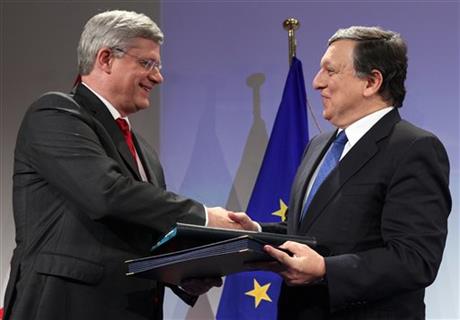
By JUERGEN BAETZ
European Commission President Jose Manuel Barroso, right, shakes hands with Canada’s Prime Minister Stephen Harper to conclude a signing ceremony at the European Commission headquarters in Brussels, Friday, Oct. 18, 2013. Canada and the European Union finalized a landmark free trade agreement to boost growth and employment in both economies. (AP Photo/Yves Logghe)
BRUSSELS (AP) — Canada and the European Union have struck a tentative free trade agreement meant to boost growth and employment, officials from both economies said Friday in Brussels.
The deal would make it easier for Canadian companies to invest in and sell to the 28-member EU and its 500 million consumers. European companies will have easier access to Canada’s 35 million people. The deal will lower tariffs, streamline regulation and cut red tape.
“This is a big deal. It is the biggest deal our country has ever made,” Canadian Prime Minister Stephen Harper said. “It means access for Canadian businesses to half a billion consumers.”
The European Union, a $17-trillion economy, is Canada’s second-largest trading partner behind the U.S. The deal would also help reduce the dependence of Canada’s $1.8-trillion economy on imports from the U.S.
European Commission President Jose Manuel Barroso said the two sides reached a “breakthrough” after four years of negotiations. “This agreement is a win-win for both sides,” he said.
The deal still requires approval by the European Parliament, EU member states and from Canada on federal and provincial levels. These are expected to be cleared in 2015.
A total of 98 percent of tariffs will be removed immediately once the agreement takes effect, Harper said. Sectors like Canada’s dairy products, particularly cheese, which are likely to suffer from higher competition and see their market share fall will receive transitional assistance by the government, he said.
The deal is “in the interest of the vast majority of Canadians,” Harper stressed. He noted that the EU was a bigger market than even North America’s NAFTA free trade zone.
The value of bilateral trade in goods between the EU and Canada was 62 billion euros in 2012 ($84 billion at today’s value) with another 23.5 billion euros in services, according to the European Commission, the EU’s executive arm. It estimates the agreement will eventually boost bilateral trade by up to a quarter.
For the EU, Canada is only the 12th most important trading partner but the agreement will provide a boost to the nascent free trade talks between the EU and the U.S.
Despite many outstanding issues, officials on both sides of the Atlantic hope to agree on the broad outline of that deal by the end of next year — a highly ambitious schedule for what would be the world’s largest free trade deal. The two economic giants combined represent just under half of the global economy.
Barroso expressed hope that the Canadian agreement will boost the talks with the U.S.
“We expect this agreement to set some standards, also for other negotiations, including with our American friends,” Barroso said. “This can be a very good signal for other agreements that we can achieve it … especially with the United States of America.”
A study commissioned by the EU estimates that a US deal could add about 120 billion euros to the EU’s gross domestic product and 95 billion euros to U.S. GDP.
The talks with the U.S. suffered a minor setback this month when the U.S. side had to cancel a long-planned negotiation round in Brussels because of the government shutdown. The next round is likely to take place next month.


